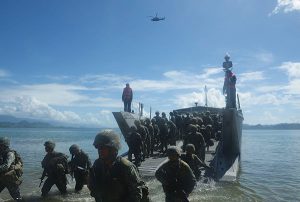Bloomberg
The US and Philippines will hold their biggest military drills in three decades as tensions grow with China, injecting new life into a
defense alliance that had
languished in recent years.
Some 5,100 American soldiers and 3,800 Philippine military members will train in the Southeast Asian nation from March 28 to April 8, the US Embassy in Manila said in a statement. They will conduct drills on maritime security, counterterrorism and disaster relief in the largest ever iteration of Balikatan, the most prominent military exercise between the nations dating back to 1991.
The annual drills come as Chinese officials warn the US is trying to build what it called an Indo-Pacific version of Nato, echoing Vladimir Putin’s justification for invading Ukraine. The Philippines has also repeatedly protested China’s increasing presence in the South China Sea and nearby waters.
The US-Philippine mutual defense treaty dates back to 1951, shortly after the former American colony became fully independent. President Rodrigo Duterte had threatened to scrap the alliance as he improved ties with China, moving to terminate the 1998 Visiting Forces Agreement that set the terms for joint exercises and engagement of US troops in the Philippines. He restored the deal last year.
“Our alliance remains a key source of strength and stability in the Indo-Pacific region,†Major General Jay Bargeron, commanding general of the US’s 3rd Marine Division, said in the statement.
This year’s military exercises also mark a return to full-scale drills that were disrupted by the pandemic. Fewer than 1,000 soldiers from the US and Philippines joined the training last year.
Chinese Foreign Ministry spokesman Wang Wenbin told reporters there is no tension with the Philippines and China hopes parties “will not artificially create tension,†when asked about the drills during a regular press briefing on Wednesday.
“We do not oppose relevant countries in conducting military exercise within their territory, but we hope the military exercise will not target third parties and not do anything that would undermine regional peace and stability,†he said.
 The Gulf Time Newspaper One of the finest business newspapers in the UAE brought to you by our professional writers and editors.
The Gulf Time Newspaper One of the finest business newspapers in the UAE brought to you by our professional writers and editors.
